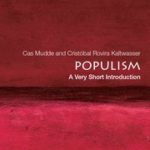 The big question for this era of European history is whether mainstream reformers will win out over populists, argues Mark Leonard, Director of the European Council on Foreign Relations. The old-new Franco-German tandem wants to reinvent the European core, thereby pushing the Euroskeptics to the fringe. But Italy’s new populist leaders want to make that fringe the new core, thereby isolating the EU’s traditional leading powers, he writes for Project Syndicate:
The big question for this era of European history is whether mainstream reformers will win out over populists, argues Mark Leonard, Director of the European Council on Foreign Relations. The old-new Franco-German tandem wants to reinvent the European core, thereby pushing the Euroskeptics to the fringe. But Italy’s new populist leaders want to make that fringe the new core, thereby isolating the EU’s traditional leading powers, he writes for Project Syndicate:
 According to a recent study from the European Council on Foreign Relations, public support for the EU declined more in Italy than in any other member state between 2007 and 2017. Little wonder, then, that Italy has quickly gone from having one of the most pro-EU governments in the bloc to serving potentially as the new vanguard of European populism.
According to a recent study from the European Council on Foreign Relations, public support for the EU declined more in Italy than in any other member state between 2007 and 2017. Little wonder, then, that Italy has quickly gone from having one of the most pro-EU governments in the bloc to serving potentially as the new vanguard of European populism.
“But all hope is not lost for those who still believe in the European project,” Leonard contends. “The silver lining of the Euroskeptics’ success is that pro-Europeans have been shaken from their complacency. The viability of both movements is about to be tested, starting in Italy.”
 The argument that populism reflects rising socioeconomic inequalities within affluent societies has long historical roots, according to the University of Michigan’s Ronald F. Inglehart and Pippa Norris of Harvard’s Kennedy School. For example, it was applied during the 1950s and 1960s in classic accounts by the fathers of political sociology, Seymour Martin Lipset and by Daniel Bell, to explain the appeal of fascism in Weimar Germany, Poujadism in France, and McCarthyism in the United States, they note in a paper examining the link between economic have-nots, cultural backlash and the rise of populism.
The argument that populism reflects rising socioeconomic inequalities within affluent societies has long historical roots, according to the University of Michigan’s Ronald F. Inglehart and Pippa Norris of Harvard’s Kennedy School. For example, it was applied during the 1950s and 1960s in classic accounts by the fathers of political sociology, Seymour Martin Lipset and by Daniel Bell, to explain the appeal of fascism in Weimar Germany, Poujadism in France, and McCarthyism in the United States, they note in a paper examining the link between economic have-nots, cultural backlash and the rise of populism.
The decline of organized labor has contributed to the economic insecurity that is a key driver of populism, some observers suggest. So would a restoration of union power help curb populism’s appeal?
 Across advanced economies, wage inequality tends to rise as the share of workers who are union members declines. A new paper examining detailed, historical data from America makes the point especially well, the Economist notes:
Across advanced economies, wage inequality tends to rise as the share of workers who are union members declines. A new paper examining detailed, historical data from America makes the point especially well, the Economist notes:
Henry Farber, Daniel Herbst, Ilyana Kuziemko and Suresh Naidu find that the premium earned by union members in America has held remarkably constant during the post-war period. But in the 1950s and 1960s the expansion of unions brought in less-skilled workers, squeezing the wage distribution and shrinking inequality. Unions are not the only way to boost worker power. More radical ideas like a universal basic income—a welfare payment made to everyone regardless of work status—or a jobs guarantee, which extends the right to a government job paying a decent wage to everyone, would shift power to workers and force firms to work harder to retain employees.
But Germany’s thriving economy has not prevented the success of the far-right populist Alternative for Germany (AfD) in recent elections, nor has it halted the ascent of right-wing labor unionists within companies, Handelsblatt reports.
The far right has been actively targeting the German working class for years, said Lothar Probst, a political scientist. And the AfD could very well become their favorite party in the near future, as has its Austrian counterpart, the FPÖ, in the neighboring country.







